过去分词 PPT
合集下载
《过去分词》课件
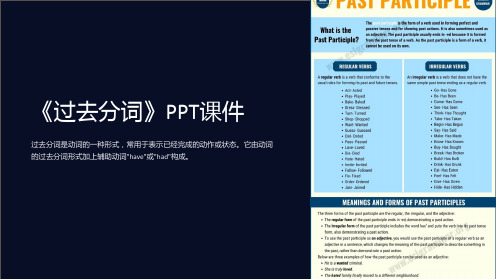
过去分词的常见错误使用
错误
"I have went to the store."
正确
"I have gone to the store."
错误
"The dog has bited me."
正确
"The dog has bitten me."
《过去分词》PPT课件
过去分词是动词的一种形式,常用于表示已经完成的动作或状态。它由动词 的过去分词形式加上辅助动词"have"或"had"构成。
什么是过去分词
形式
动词的过去分词形式由动词原形加上"-ed"(或其他变形)构成。
功能
过去分词可以用作谓语动词、形容词或独立的名词。
举例
例如:"The broken vase"(打破的花瓶,过去分词作形容词)。
作为名词
例如:"My chosen candidate won the election."
过去分词的时态
过去分词的时态由前面的助动词来决定,如"have"表示现在完成时,"had"表示过去完成时。
现在完成时
例如:"I have finished my homework."
过去完成时
例如:"She had already left when I arrived."
1 完成动作
过去分词可以表示已经完 成的动作,如:"He has eat语 态,如:"The book was written by Mark Twain."
非谓语动词之现在分词和过去分词.ppt.ppt

想加入本俱乐部的人在这里签名。
The man, who had been disturbed so badly, almost lost his memory.) (The man, having been disturbed so badly, almost lost his memory.
由于被严重困扰,这个人几乎失去了记忆。
4
(4)过去分词作定语在意义上有两种可能:表示被动和 完成,只表完成。如:
the question discussed yesterday 昨天讨论的问题 (既表示被动也表示完成)
the fallen leaves •落下的树叶 (只表示完成,不表示被动)
2、作表语 分词作表语表示主语的某种性质或状态。如: She was too frightened to move. 她被吓得一动不动。 What you said is really inspiring. 你所说的真令人鼓舞。
(Seeing/seen) from the top of the tower, the factory looks beautiful. When the factory is seen from the top of the tower, the Factory looks beautiful.
After he was scolded by the teacher, he was very sad.
17
4.Not knowing where to go, he asked a policeman .
Because he didn’t know where to go, he asked a policeman.
5
3、作宾语补足语
The man, who had been disturbed so badly, almost lost his memory.) (The man, having been disturbed so badly, almost lost his memory.
由于被严重困扰,这个人几乎失去了记忆。
4
(4)过去分词作定语在意义上有两种可能:表示被动和 完成,只表完成。如:
the question discussed yesterday 昨天讨论的问题 (既表示被动也表示完成)
the fallen leaves •落下的树叶 (只表示完成,不表示被动)
2、作表语 分词作表语表示主语的某种性质或状态。如: She was too frightened to move. 她被吓得一动不动。 What you said is really inspiring. 你所说的真令人鼓舞。
(Seeing/seen) from the top of the tower, the factory looks beautiful. When the factory is seen from the top of the tower, the Factory looks beautiful.
After he was scolded by the teacher, he was very sad.
17
4.Not knowing where to go, he asked a policeman .
Because he didn’t know where to go, he asked a policeman.
5
3、作宾语补足语
过去式过去分词(完整版)PPT

四
May
五
June
六
July
七
August September October November December
八 九 十 十一 十二
3
Numbers
• three-third-thirteenth-thirtieth • four-fourth-fourteenth-fortieth • five-fifth-fifteenth-fiftieth • eight-eighth-eighteenth-eightieth • nine-ninth-nineteenth-ninetieth • twelve-twelfth • one hundredth
sell sold sold shoot shot shot sit sat sat sleep slept slept smell smelt smelt strike struck struck sweep swept swept stand stood stood win won won wind wound wound begin began begun bite bit bitten blow blew blown break broke broken
易错的过去式,过去分词
set set set read read read spread spread ~ bring brought ~ burn burnt burnt catch caught ~~~ feel felt ~~ fight fought ~~~ find found ~~~ hang hung ~~~ lay laid laid lie lay lain lend lent lent mean meant meant
过去分词PPT教材课件

I saw her taken out of the classroom.
3. 使役动词: make, get, have, keep ,leave, etc.
e.g. We must get the table cloth washed. = We must ask somebody to wash the table cloth. He had his watch repaired.
e.g. 2. Given more time, I’ll catch up with you. 过去分词作条件状语相当于条件状语从句 (If I am) given more time, I’ll catch up with you. e.g. 3. Born and brought up in the village, he knows a lot of people there. 过去分词作原因状语相当于原因状语从句 (Because he was) born and brought up in the village, he knows a lot of people there.
常见的这类此有: interesting — interested encouraging — encouraged delighting—delighted disappointing—disappointed pleasing—pleased puzzling—puzzled satisfying—satisfied surprising—surprised worrying--worried
4.在“with / without+宾语+宾补(过去分 词)”这一结构中,过去分词与宾语之间是动 宾关系。 e.g. Do you know the man with his hair tied back?
过去分词用法总结(共53张PPT)
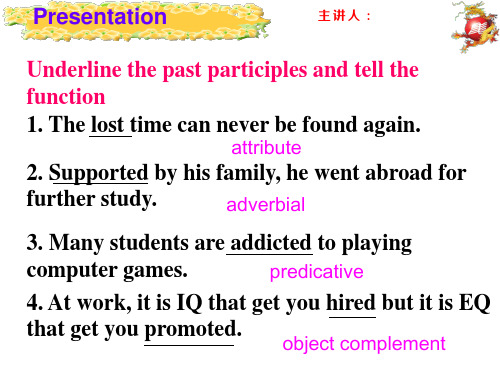
further study.
adverbial
3. Many students are addicted to playing
computer games.
predicative
4. At work, it is IQ that get you hired but it is EQ that get you promoted.
What is the language that is spoken in Italy?
What is the language spoken in Italy?
Do you know all the artists invited to the party?
Do you know all the artists who were invited to the party?
1.语态上
现在分词: 表示主动的动作 过去分词: 表示已经被动的动作
I heard someone opening the door .
I heard the door opened .
2.时间上
现在分词: 表示正在进行的动作 过去分词: 表示完成的意思
the falling leaves boiling water the rising sun the fallen leaves boiled water the risen sun
Presentation
主讲人:
Underline the past participles and tell the
function
1. The lost time can never be found again.
attribute
公开课--过去分词版演示课件.ppt
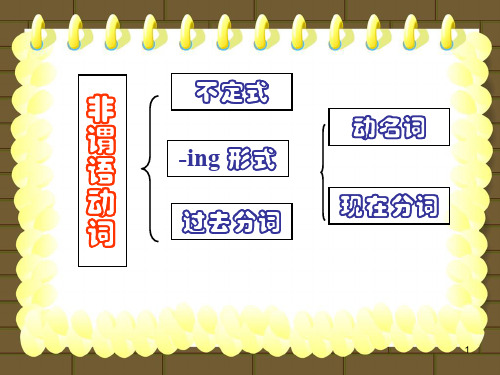
8
It was snowing and very cold outside.
A little girl was walking in the street,
selling matches.
9
She didn’t wear any shoes because she had her shoes lost.
主语 宾语 定语
Seeing is believing.
表语
3
an sleeping car
现
在 The news is excitinபைடு நூலகம்.
分
词
的 Can you hear her singing
使 用
in the room?
Being ill,he didn’t go to school.
定语
表语 宾语补
All books borrowed from the library should be returned by Friday.
Conclusion 3:
过去分词短语通常作 后置 定语,并与其所修饰的名
词构成 被动 和 完成 的关系,相当于一个含被动语态
的定语从句。
17
Recite the sentence
12
The lighted candles were
burning brightly and she seemed
very delighted.
13
She lit another one and saw her grandmother. Taken by her grandmother, the little girl went to another place where there was no hunger.
It was snowing and very cold outside.
A little girl was walking in the street,
selling matches.
9
She didn’t wear any shoes because she had her shoes lost.
主语 宾语 定语
Seeing is believing.
表语
3
an sleeping car
现
在 The news is excitinபைடு நூலகம்.
分
词
的 Can you hear her singing
使 用
in the room?
Being ill,he didn’t go to school.
定语
表语 宾语补
All books borrowed from the library should be returned by Friday.
Conclusion 3:
过去分词短语通常作 后置 定语,并与其所修饰的名
词构成 被动 和 完成 的关系,相当于一个含被动语态
的定语从句。
17
Recite the sentence
12
The lighted candles were
burning brightly and she seemed
very delighted.
13
She lit another one and saw her grandmother. Taken by her grandmother, the little girl went to another place where there was no hunger.
动词的过去式和过去分词(共20张PPT)

(1) AAA型(动词原形、过去式、 过去分词同形)
cost(花费) cost cost cut(割) cut cut
hit(打) hit hit hurt 伤害) hurt hurt
let(让) let let put(放) put put
read (读) read read spread (伸展/ 传播) spread spread
understand take
mistake
came became
sat babysat
got forgot
stood understood
took
mistook
3. keep feel sleep
sweep leave meet feed speak freeze
kept felt slept swept left
fly---- flew rode
know(知道) knew known
throw(投掷)threw (4) ABB型(过去式与过去分词同形)4
put(放) put put
thrown
read (读) sell(卖)
read rseahdow(出示)
sold sold
showed
shown
tell(告诉) told told
wear (穿) wore worn be ( am, is, are )(是)was, were been
hit
1. beat
beat
cost
hurt
cut
cut
set
let
let
put
put
read
read
[red]
2. come become sit babysit get forget stand
cost(花费) cost cost cut(割) cut cut
hit(打) hit hit hurt 伤害) hurt hurt
let(让) let let put(放) put put
read (读) read read spread (伸展/ 传播) spread spread
understand take
mistake
came became
sat babysat
got forgot
stood understood
took
mistook
3. keep feel sleep
sweep leave meet feed speak freeze
kept felt slept swept left
fly---- flew rode
know(知道) knew known
throw(投掷)threw (4) ABB型(过去式与过去分词同形)4
put(放) put put
thrown
read (读) sell(卖)
read rseahdow(出示)
sold sold
showed
shown
tell(告诉) told told
wear (穿) wore worn be ( am, is, are )(是)was, were been
hit
1. beat
beat
cost
hurt
cut
cut
set
let
let
put
put
read
read
[red]
2. come become sit babysit get forget stand
《过去分词》课件

例如,cost -> cost, hurt -> hurt
03
过去分词的用法
作为谓语使用
总结词
表示被动或完成
详细描述
过去分词在谓语中常用于表示被动或完成的状态,如“The book was borrowed by me yesterday. (这本书昨天被我借走了。)”中的“borrowed”表示被动,“The dishes have been washed. (盘子 已经洗完了。)”中的“washed”表示完成。
要点一
总结词
表示时间、条件、原因等
要点二
详细描述
过去分词可以作为状语,表示时间、条件、原因等,如 “Having finished the work, she went home. (完成工 作后,她回家了。)”中的“Having finished”表示时间 ,“If seen from the hill, the city looks more beautiful. (如果从山上俯瞰,这座城市看起来更美。)”中 的“seen”表示条件。
填空题练习
总结词
检验学生的应用能力
详细描述
填空题练习主要检验学生是否能够在具体的 语境中正确运用过去分词。这种题型可以帮 助学生更好地理解过去分词的用法,并提高 他们的语言应用能力。
翻译题练习
总结词
提升学生的语言转换能力
详细描述
翻译题练习主要通过英汉互译的方式,让学 生在实际操作中加深对过去分词的理解和运 用。这种题型可以帮助学生提高语言转换能
过去分词
强调动作的完成和结果,常与时间状 语连用,表示某个动作在某个时间点 之前已经完成。
现在分词
强调动作的进行和过程,常与时间状 语连用,表示某个动作正在进行中。
03
过去分词的用法
作为谓语使用
总结词
表示被动或完成
详细描述
过去分词在谓语中常用于表示被动或完成的状态,如“The book was borrowed by me yesterday. (这本书昨天被我借走了。)”中的“borrowed”表示被动,“The dishes have been washed. (盘子 已经洗完了。)”中的“washed”表示完成。
要点一
总结词
表示时间、条件、原因等
要点二
详细描述
过去分词可以作为状语,表示时间、条件、原因等,如 “Having finished the work, she went home. (完成工 作后,她回家了。)”中的“Having finished”表示时间 ,“If seen from the hill, the city looks more beautiful. (如果从山上俯瞰,这座城市看起来更美。)”中 的“seen”表示条件。
填空题练习
总结词
检验学生的应用能力
详细描述
填空题练习主要检验学生是否能够在具体的 语境中正确运用过去分词。这种题型可以帮 助学生更好地理解过去分词的用法,并提高 他们的语言应用能力。
翻译题练习
总结词
提升学生的语言转换能力
详细描述
翻译题练习主要通过英汉互译的方式,让学 生在实际操作中加深对过去分词的理解和运 用。这种题型可以帮助学生提高语言转换能
过去分词
强调动作的完成和结果,常与时间状 语连用,表示某个动作在某个时间点 之前已经完成。
现在分词
强调动作的进行和过程,常与时间状 语连用,表示某个动作正在进行中。
过去分词变化规则-PPT课件

2.词尾为-ow,-aw时,过去式将其变为-ew,过去分词在 其原形后加n。
blow—blew—blown draw—drew—drawn grow— grew—grown know—knew—known throw—threw—thrown (show除外)
3.词尾为“i+辅(1个)+e”,过去式将i变为o,过去 分词多在原形后加n,若那个辅音字母为d或t,须双写d或 t后加n。(give,hide除外)
过去分词的用法
表示动作的完成 或者被动
一.AAA型(动词原形、过去式、过去分词同形)
cost(花费)cost--cost cut(割)--cut--cut hit(打)--hit-- hit hurt 伤害)--hurt-- hurt let(让)--let --let put(放)--put --put read (读)--read-- read
11.改变元、辅音字母。
leave—left—left stand—stood—stood have(has)— had—had understand—understood—understood
五.ABC型(动词原形、过去式与过去分词三者不同形)
1.i—a—u变化。
begin—began—begun drink—drank—drunk sing— sang—sung ring—rang—rung swim—swam—swum sink— sank—sunk
2.词尾有-ild,-end时,只需把d变为t。
build—built—built lend—lent— lent send—sent—sent spend—spent— spent
3.过去式、过去分词都含有 -aught。
过去分词PPT课件

Ⅰ. Finish the following exercises.
1. If I had the chance, I would have a c_l_o_n_e_d_ (clone) baby.
A.clone C. cloning
B. to clone D. cloned
If I had the chance, I would have a baby w__h_o_i_s_c_l_o_n_e_d_.
规律(1):
单个的及物动词-ed形式作定语往往置于被修饰词_前___
(前/后),表示__被__动__或__完__成___(主动/进行/被动/完成)
意义,可改写成动词用__被__动____(主动/被动)形式的
_定__语__从__句___。
2021
18
* 过去分词短语作定语,置于被修饰词的后面 ,同样可改成定语从句。
finish-finished know-known complete-completed fall-fallen imagine-imagined forget-forgotten
规则动词的过去分词直接在动词词尾加
上-ed或 -d , 不规则动词的过去分词有不 规则的变化,需要单独记忆。
2021
3
work in the USA, a
developed country.
Now he lives in the
countryside. He is
taking a walk on the
path(小路) which is
covered with fallen
leaves.
2021
24
1. What does fallen leaves mean?
过去分词课件PPT课件
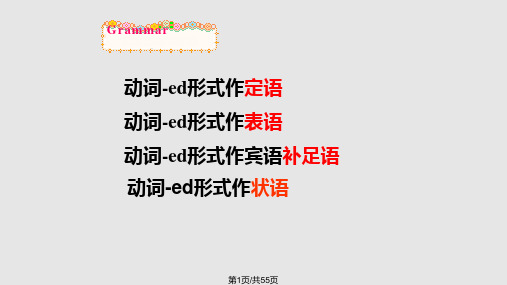
Grammar
动词-ed形式作定语 动词-ed形式作表语 动词-ed形式作宾语补足语 动词-ed形式作状语
第1页/共55页
一、动词-ed形式作定语
过去分词作定语往往与被修饰的词靠得很 紧, 渐渐地成为一个复合词。这种分词叫分词
形容词 (the Participle Adjective), 实际上相当
动词的-ed形式可以在“主语+谓语+宾 语+宾语补足语”句型中充当宾语补足语。 在这一结构中, 动词-ed形式和它前面的宾 语构成逻辑上的被动关系。如果这种句子 改为被动语态,原来的宾语补足语变成了主 语补足语。
第17页/共55页
People found the girl beaten black and blue. 人们发现这个女孩被打得青一块紫一块。 (宾语补足语) The girl was found beaten black and blue. (主语补足语)
He grew much tired of the work.
他十分厌倦这工作。
He seemed quite delighted at the idea.
听了这想法他似乎很高兴。 第12页/共55页
高考题
1) Cleaning women in big cities usually get
____ by the hour. (NMET98)
I have never heard him spoken ill of others.
我从未听过有人说他的坏话。
She felt a great weight taken off her mind.
她觉得心里轻松了些。
They considered the matter settled.
动词-ed形式作定语 动词-ed形式作表语 动词-ed形式作宾语补足语 动词-ed形式作状语
第1页/共55页
一、动词-ed形式作定语
过去分词作定语往往与被修饰的词靠得很 紧, 渐渐地成为一个复合词。这种分词叫分词
形容词 (the Participle Adjective), 实际上相当
动词的-ed形式可以在“主语+谓语+宾 语+宾语补足语”句型中充当宾语补足语。 在这一结构中, 动词-ed形式和它前面的宾 语构成逻辑上的被动关系。如果这种句子 改为被动语态,原来的宾语补足语变成了主 语补足语。
第17页/共55页
People found the girl beaten black and blue. 人们发现这个女孩被打得青一块紫一块。 (宾语补足语) The girl was found beaten black and blue. (主语补足语)
He grew much tired of the work.
他十分厌倦这工作。
He seemed quite delighted at the idea.
听了这想法他似乎很高兴。 第12页/共55页
高考题
1) Cleaning women in big cities usually get
____ by the hour. (NMET98)
I have never heard him spoken ill of others.
我从未听过有人说他的坏话。
She felt a great weight taken off her mind.
她觉得心里轻松了些。
They considered the matter settled.
高中英语过去分词的用法课件(共53张PPT)
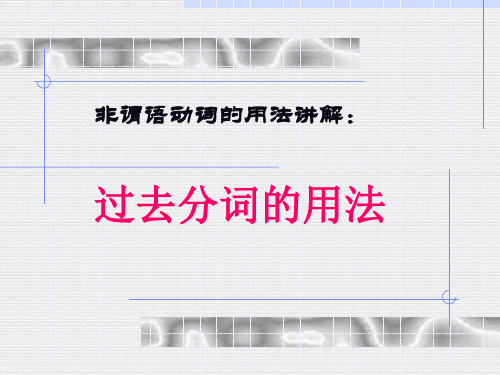
– Can those ____ at the
back of the classroom
hear me?
A. seat
B. sit
C. seated D. sat
35、___ in the queue for half an hour, the man suddenly realized he had left the money in the car. A. Waiting B. To wait C. Having Waited D. To have waited
非谓语动词的用法讲解:
过去分词的用法
过去分词作定语
作定语用的过去分词相当于形容词,表被动或表完成
1. 过去分词用作定语,如果是单个词语,常置于其所修 饰的名词之前。
The injured workers are now being taken care of in the hospital.
2.过去分词用作定语,如果是短语,一般置于其所修饰的 名词之后,其意义相当于一个定语从句。
The two theories were interesting. The news were disappointing. The result of the exam is delighting. What he does is satisfying.
• They were __s_u_rp__ri_s_e_d__ at the news.(惊奇于)
因为写得匆忙,这篇文章不是很好。
值得注意的是,有些过去分词作状语时不表 被动而表主动。这样的过去分词及短语常见 的有:
lost ( 迷 路 ) ; seated ( 坐 ) ; hidden ( 躲 ) ; stationed ( 驻 扎 ) ; lost / absorbed in ( 沉 溺 于 ) ; born (出身于); dressed in (穿着); tired of (厌烦)。
过去分词用法-PPT课件

•9
定语
3. 被修饰词是由 不定代词 Every/ some/ any/no + thing/ body 所构成的,V-ed后置。 例:有人受伤吗? Is anybody injured?
•10
定语
4. V-ed 短语做(后置)定语,相当于定语从句 He is reading a novel written by Lu Xun. He is reading a novel (which was) written by Lu Xun.
•23
宾语补足语
• 3. 表“希望”、“要求”、“命令” 等 • 如 like, want, wish, order……
例:我可不想我的女儿天黑以后被带出去 I don’t want my daughter to be taken out after dark.
* Want to do sth. Want sb./ sth. done (被动)
•24
宾语补足语
• (to) V./ V-ing/ V-ed 作宾补的区别 I saw him take away the book just now. 主动(结果) I saw him taking away the book on the desk正. 在(过程) I saw the book taken away by a child. 被动
* See sb./ sth. done
•21
宾语补足语
2. 表“使让” 使役动词(let, make, get, keep, leave, have) + V-ed, 表使让。
It was so cold that the driver couldn’t get the car started.
定语
3. 被修饰词是由 不定代词 Every/ some/ any/no + thing/ body 所构成的,V-ed后置。 例:有人受伤吗? Is anybody injured?
•10
定语
4. V-ed 短语做(后置)定语,相当于定语从句 He is reading a novel written by Lu Xun. He is reading a novel (which was) written by Lu Xun.
•23
宾语补足语
• 3. 表“希望”、“要求”、“命令” 等 • 如 like, want, wish, order……
例:我可不想我的女儿天黑以后被带出去 I don’t want my daughter to be taken out after dark.
* Want to do sth. Want sb./ sth. done (被动)
•24
宾语补足语
• (to) V./ V-ing/ V-ed 作宾补的区别 I saw him take away the book just now. 主动(结果) I saw him taking away the book on the desk正. 在(过程) I saw the book taken away by a child. 被动
* See sb./ sth. done
•21
宾语补足语
2. 表“使让” 使役动词(let, make, get, keep, leave, have) + V-ed, 表使让。
It was so cold that the driver couldn’t get the car started.
过去分词的用法全面(共46张PPT)

eg: There was nobody invited here. I want to find somebody interested in the
case.
2. v-ed作定语与定语从句的互换: (1) 若是vt.的过去分词作定语表示已经完成的 动作,且含有被动意义,可改成v.用被动形 式的定语从句。
eg: surprisng; moved/ moving...
二、作定语 (attribute)
1. 前置定语:单个的v-ed作定语,一般放在 被修饰的n.之前; 后置定语:v-ed短语作定语时,常被放在被 修饰的n.之后,相当于一个定语从句。 eg: an invited guest 一位受到邀请的客人
过去分词所充当的成分:
一、作表语 (predicative)
1. 过去分词作表语,表示主语的心理感觉或 所处的状态,其用法相当于adj.,放在系动 词后面。 eg: The door remained locked till 7 o’clock.
eg: I am pleased with the result of the
eg: The injured bird lay on the ground.
eg: a letter written in blue ink
eg: The boy named Tom is my brother.
注意:
如果被修饰的词是复合不定代词或指示代词 those等时,即使是一个单一的分词作定语也 要放在被修饰的词之后。
eg: The letter posted today will reach you in a week. =
The letter which was posted today will...
case.
2. v-ed作定语与定语从句的互换: (1) 若是vt.的过去分词作定语表示已经完成的 动作,且含有被动意义,可改成v.用被动形 式的定语从句。
eg: surprisng; moved/ moving...
二、作定语 (attribute)
1. 前置定语:单个的v-ed作定语,一般放在 被修饰的n.之前; 后置定语:v-ed短语作定语时,常被放在被 修饰的n.之后,相当于一个定语从句。 eg: an invited guest 一位受到邀请的客人
过去分词所充当的成分:
一、作表语 (predicative)
1. 过去分词作表语,表示主语的心理感觉或 所处的状态,其用法相当于adj.,放在系动 词后面。 eg: The door remained locked till 7 o’clock.
eg: I am pleased with the result of the
eg: The injured bird lay on the ground.
eg: a letter written in blue ink
eg: The boy named Tom is my brother.
注意:
如果被修饰的词是复合不定代词或指示代词 those等时,即使是一个单一的分词作定语也 要放在被修饰的词之后。
eg: The letter posted today will reach you in a week. =
The letter which was posted today will...
- 1、下载文档前请自行甄别文档内容的完整性,平台不提供额外的编辑、内容补充、找答案等附加服务。
- 2、"仅部分预览"的文档,不可在线预览部分如存在完整性等问题,可反馈申请退款(可完整预览的文档不适用该条件!)。
- 3、如文档侵犯您的权益,请联系客服反馈,我们会尽快为您处理(人工客服工作时间:9:00-18:30)。
=The book, which was written in 1957, tells the struggle of the miners.
注:The problem (discussed yesterday) has something to do with daily life. (表示完成)
I saw her come into the classroom.
I saw her coming into the classroom.
I saw her taken out of the classroom.
3. 使役动词: make, get, have, keep ,leave, etc.
现在分词: 表示动作是主动的和正在进行 过去分词: 表示动作是被动的和完成
一般式
现在分词 形式
doing
过去分词 形式
done
完成式 having done having been done
分词在句中可以作表语、定语、宾语补足 语和状语。
I. Past participle used as attributes (定语)
2.作用---相当于一个定语从句 (1)Is there anything planned for tonight ?
=Is there anything that has been planned for tonight? (2)The book, written in1957, tells the struggle of the miners.
III. Past participle used as the Object
Complement (宾语补足语)
1. 表“希望,要求”的动词: want, wish, expect, wish, like, order + (to be) done 表示“希望/要求某人或某事被…”
e.g. I want the work (to be) finished by Sunday. Jim ordered the room (to be) cleaned.
1.位置: 单个分词位于名词前,短语则在名词后, 被过去分词所修饰的名词,就是该分词的逻辑 主语。
The stolen car was found by the police last week.
The speaker answered all the questions raised by the audience.
anew look.
A.planting B.planted
C.to plant
D.to be planted
5. She was glad to see her child well_____ care of.
A. take B. to be taken C. taken D. taking
6.The result of the entrance exams was not made _____to
e.g. We must get the table cloth washed. = We must ask somebody to wash the table cloth.
He had his watch repaired.
4.在“with / without+宾语+宾补(过去分 词)”这一结构中,过去分词与宾语之间是动 宾关系。
1. When asked why he didn’t do it, he began to cry. 2. If given more time, I’ll catch up with you.
3. As / Because born and brought up in the village, he knows a lot of people there. 4. Although defeated many times, they continue to fight.
e.g. 4. Defeated many times, they continue to fight. 过去分词作让步状语相当于让步状语从句
(Although they had been) defeated many times, they continued to fight.
e.g.5. The teacher entered the classroom, followed by a group of students.
• The managers discussed the plan that
• they would like to see____the next year.
• A.carry out
B.carrying out
• C.carried out
D.to carry out
• 2.Mrs. Brown was much disappointed
e.g. 3. Born and brought up in the village, he knows a lot of people there.
过去分词作原因状语相当于原因状语从句 (Because he was) born and brought up in the village, he knows a lot of people there.
_F_i_n_is_h_e_d____ (信写完之后),the letter should be read to the one who asks you to write it.
从山顶看, 我们能看到一个美丽的公园。
Seeing from the top of the hill, we can see a beautiful park.
the newly-elected president is having
a hard time.
A.settled
B.settling
C.to settle
D.being settled
4.With trees,flowers and grass_____
everywhere, my native town had taken
Have you heard a pop song sung in Japanese?
大家点
9
过去分词, 不定式, 现在分词作宾补的 区别:三者与宾语逻辑上都是主谓关系, 但过去分词强调他们之间的被动关系, 不带to的不定式强调动作发生的全过程, 现在分词强调他们之间的主动关系,正在 进行。
类似的还有:
be lost in;
be dressed in;
be interested in; be devoted to;
be supposed to; be caught in the rain;
be seated in; be prepared for;
be determined to
有些固定用法:
_W_h__en__v_i_si_t_e_d_ (当有人夜里来访)at night , you must make sure the visitor really your friend.
_H__a_v_in_g__f_in_i_s_h_e_d_a_l_l_m__y_l_et_t_e_r_s___ (写完了所有 的信之后),I had a drink and went out.
表示方式和伴随情况时可以转换为一个并列的谓语 成分。
The teacher entered the classroom (and he was followed) by a group of student.
过去分词作状语时, 为了使意义更加明确,也可以在pp. 前加上对应的连词when, as, if 等等.
2. 表“感觉, 心理状态”的动词: see, hear, find, feel, think, watch, notice + object(宾语) + p.p.
e.g. We saw the thief caught by the police.
People found the water polluted.
• to see the washing machine she had had
• _______went wrong again.
• A.it
B. it repaired
• C.repaired D. to be repaired
3.With a lot of difficult problems_____,
e.g. Do you know the man with his hair tied back?
IV. Past participle used as the Adverbial(状语) 过去分词作状语相当于状语从句。
e.g. 1. Asked why he didn’t do it, he began to cry. 过去分词作时间状语相当于时间状语从句
The problem (being discussed now) has nothing to do with daily life. (表示正在进行)
II. Past participles used as predictive(表语)
1. 过去分词作表语,表示主语所处的状态, 其逻辑主语就是句子的主语。
从山顶看, 公园很美丽。 Seen from the top of the hill, the park is beautiful.
2.系表结构表示主语所处的状态
L_o_s_t_ in thought, he almost ran into the car in front of him. ( lose) D_r_e_s_se_d_ in white, she looks more beautiful.( dress)
注:The problem (discussed yesterday) has something to do with daily life. (表示完成)
I saw her come into the classroom.
I saw her coming into the classroom.
I saw her taken out of the classroom.
3. 使役动词: make, get, have, keep ,leave, etc.
现在分词: 表示动作是主动的和正在进行 过去分词: 表示动作是被动的和完成
一般式
现在分词 形式
doing
过去分词 形式
done
完成式 having done having been done
分词在句中可以作表语、定语、宾语补足 语和状语。
I. Past participle used as attributes (定语)
2.作用---相当于一个定语从句 (1)Is there anything planned for tonight ?
=Is there anything that has been planned for tonight? (2)The book, written in1957, tells the struggle of the miners.
III. Past participle used as the Object
Complement (宾语补足语)
1. 表“希望,要求”的动词: want, wish, expect, wish, like, order + (to be) done 表示“希望/要求某人或某事被…”
e.g. I want the work (to be) finished by Sunday. Jim ordered the room (to be) cleaned.
1.位置: 单个分词位于名词前,短语则在名词后, 被过去分词所修饰的名词,就是该分词的逻辑 主语。
The stolen car was found by the police last week.
The speaker answered all the questions raised by the audience.
anew look.
A.planting B.planted
C.to plant
D.to be planted
5. She was glad to see her child well_____ care of.
A. take B. to be taken C. taken D. taking
6.The result of the entrance exams was not made _____to
e.g. We must get the table cloth washed. = We must ask somebody to wash the table cloth.
He had his watch repaired.
4.在“with / without+宾语+宾补(过去分 词)”这一结构中,过去分词与宾语之间是动 宾关系。
1. When asked why he didn’t do it, he began to cry. 2. If given more time, I’ll catch up with you.
3. As / Because born and brought up in the village, he knows a lot of people there. 4. Although defeated many times, they continue to fight.
e.g. 4. Defeated many times, they continue to fight. 过去分词作让步状语相当于让步状语从句
(Although they had been) defeated many times, they continued to fight.
e.g.5. The teacher entered the classroom, followed by a group of students.
• The managers discussed the plan that
• they would like to see____the next year.
• A.carry out
B.carrying out
• C.carried out
D.to carry out
• 2.Mrs. Brown was much disappointed
e.g. 3. Born and brought up in the village, he knows a lot of people there.
过去分词作原因状语相当于原因状语从句 (Because he was) born and brought up in the village, he knows a lot of people there.
_F_i_n_is_h_e_d____ (信写完之后),the letter should be read to the one who asks you to write it.
从山顶看, 我们能看到一个美丽的公园。
Seeing from the top of the hill, we can see a beautiful park.
the newly-elected president is having
a hard time.
A.settled
B.settling
C.to settle
D.being settled
4.With trees,flowers and grass_____
everywhere, my native town had taken
Have you heard a pop song sung in Japanese?
大家点
9
过去分词, 不定式, 现在分词作宾补的 区别:三者与宾语逻辑上都是主谓关系, 但过去分词强调他们之间的被动关系, 不带to的不定式强调动作发生的全过程, 现在分词强调他们之间的主动关系,正在 进行。
类似的还有:
be lost in;
be dressed in;
be interested in; be devoted to;
be supposed to; be caught in the rain;
be seated in; be prepared for;
be determined to
有些固定用法:
_W_h__en__v_i_si_t_e_d_ (当有人夜里来访)at night , you must make sure the visitor really your friend.
_H__a_v_in_g__f_in_i_s_h_e_d_a_l_l_m__y_l_et_t_e_r_s___ (写完了所有 的信之后),I had a drink and went out.
表示方式和伴随情况时可以转换为一个并列的谓语 成分。
The teacher entered the classroom (and he was followed) by a group of student.
过去分词作状语时, 为了使意义更加明确,也可以在pp. 前加上对应的连词when, as, if 等等.
2. 表“感觉, 心理状态”的动词: see, hear, find, feel, think, watch, notice + object(宾语) + p.p.
e.g. We saw the thief caught by the police.
People found the water polluted.
• to see the washing machine she had had
• _______went wrong again.
• A.it
B. it repaired
• C.repaired D. to be repaired
3.With a lot of difficult problems_____,
e.g. Do you know the man with his hair tied back?
IV. Past participle used as the Adverbial(状语) 过去分词作状语相当于状语从句。
e.g. 1. Asked why he didn’t do it, he began to cry. 过去分词作时间状语相当于时间状语从句
The problem (being discussed now) has nothing to do with daily life. (表示正在进行)
II. Past participles used as predictive(表语)
1. 过去分词作表语,表示主语所处的状态, 其逻辑主语就是句子的主语。
从山顶看, 公园很美丽。 Seen from the top of the hill, the park is beautiful.
2.系表结构表示主语所处的状态
L_o_s_t_ in thought, he almost ran into the car in front of him. ( lose) D_r_e_s_se_d_ in white, she looks more beautiful.( dress)
